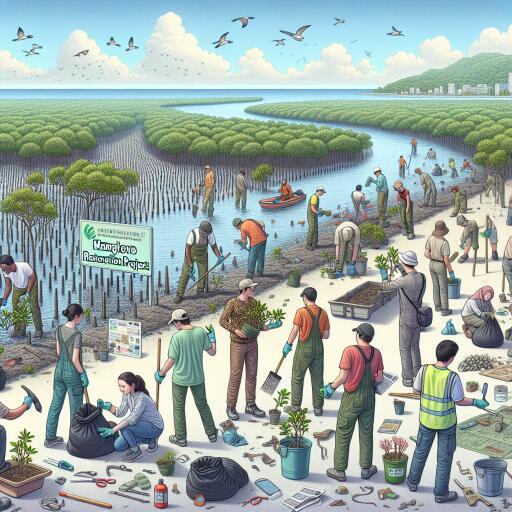
Earthna Pioneers Mangrove Restoration Efforts in Qatar
In an ambitious move towards environmental sustainability, the Earthna Center for a Sustainable Future, under the aegis of Qatar Foundation, has teamed up with the Ministry of Environment and Climate Change to spearhead a pioneering mangrove restoration initiative in Qatar.
At the forefront of this ecological venture, Dr. Gonzalo Castro de la Mata, Executive Director of Earthna Center, recently shed light on the project’s goals and its anticipated impact on the nation’s ecological and climate resilience. The initiative underscores the pivotal role of mangroves in coastal defense, biodiversity conservation, and climate change mitigation.
“In a region where shoreline stability and protection against sea level rise are paramount, mangroves offer a natural safeguard. Their significance cannot be overstated, especially for a country like Qatar, where they act as critical bulwarks against the encroaching sea,” Dr. Mata emphasized.
This comprehensive project is being carried out in collaboration with Qatar University and focuses on the twin pillars of research and restoration. The objective is to rehabilitate ailing mangrove habitats through a blend of scientific research and direct conservation activities, aiming to deepen the understanding of their ecological importance and fortify their role in the nation’s environmental health.
Mangroves are celebrated for their exceptional ability to absorb carbon dioxide, significantly ameliorating air quality and contributing to the fight against global climate change. Additionally, their presence is crucial in preventing coastal erosion, maintaining water quality, and supporting a diverse array of wildlife, underscoring their importance in maintaining ecological balance.
In Qatar, the significance of mangroves extends beyond their environmental benefits, contributing to the country’s sustainability efforts and enhancing biodiversity. There has been a concerted effort towards the conservation of these vital ecosystems, with the Ministry of Environment and Climate Change at the helm of initiatives to cultivate mangroves in strategic locations along the northern and eastern coasts — including Al Ruwais, Umm Al Houl, Fuwairit, and Ras Matbakh.
The partnership extends to international collaborations, including a notable project initiated in 2012 with UNESCO, which explored the utilization of mangroves in carbon sequestration and atmospheric carbon reduction. “Our project builds on these foundational efforts, ensuring continuity and advancement in the conservation of mangrove ecosystems. Collaboration with key stakeholders, including those involved in UNESCO’s projects, is a crucial element of our strategy,” stated Dr. Mata.
By integrating research, conservation, and collaboration, the mangrove restoration initiative by Earthna aims to set a benchmark for environmental sustainability in Qatar, showcasing the country’s commitment to combating climate change while preserving its unique natural heritage for future generations.





Leave a Reply